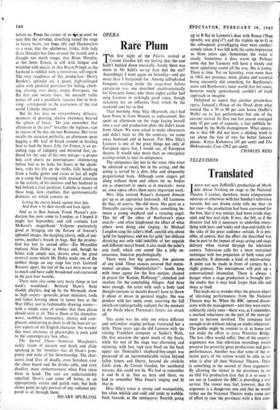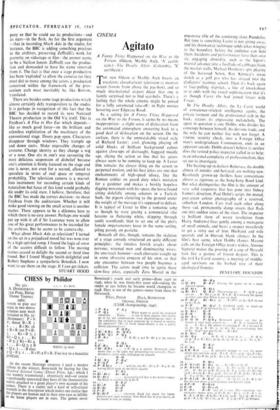Translated
TELEVISION HAVE not seen Zeffirelli's production of Much I A do About Nothing on stage at the National Theatre. I cannot, therefore, make comparisons odorous or otherwise with last Sunday's television version; but our drama critic tells me that—in her view—the production had been coarsened for the box, that it was noisier, bad more crude slap- stick and less real style. It was, she felt, as if the director had felt it necessary to underline every- thing with leers and winks and slap-and-tickle for the sake of the great audience outside. It is pos- sible, of course, that the effect she described was due in part to the impact of stage acting and stage delivery when viewed through the television camera. Television calls for a more restrained technique with less projection of both voice and personality. It demands a kind of micro-acting. A point can be made in front of camera by a slight grimace. The microphone will pick up a conversational intonation. There is always a danger when a stage production is brought into the studio that it may look larger than life and twice as loud.
This leads me to wonder what the precise object of televising performances from the National Theatre may be. When the BBC opened discus- sions with the management—and they were extra- ordinarily sticky ones—there was, as I remember, a marked reluctance on the part of the manage- ment to become involved. The company had enough to do without taking on studio rehearsals. The public might be content to sit at home and not make the effort to cross Waterloo Bridge. The box office would suffer. One of the counter- arguments was that television recordings would preserve for posterity great productions and great performances. Another was that some of the re- moter parts of the nation would be able to see what is after all their National Theatre. There is something in the second of these arguments. By allowing the viewer in the provinces to see an Old Vic production (not that it is so easy to see one in London) the BBC is providing a real service. The viewer may feel, however, that the argument is a dangerous one and that he would rather see the National Theatre make some sort of effort to tour the provinces with a first com-
pany so that he could see its productions—and its stars—in the flesh. As for the first argument —that in recording Much Ado in the studio, for instance, the BBC is adding something precious to the archives, preserving Zeffirelli's work for posterity on videotape or film—the answer seems to be a Sicilian lemon. Zeffirelli saw the produc- tion and demanded to have his name removed from it. The fact is that once a stage production has been 'exploded' to allow the cameras (as they must do) to move among the actors a production conceived within tbe framework of the pros- cenium arch must inevitably be, like Bottom, translated.
There are besides some stage productions which almost certainly defy transposition to the studio. It is perhaps in recognition of this fact that the BBC has decided to record its next National Theatre production in the Old Vic itself. This is Feydeau's A Flea in Her Ear which depends— like so much good farce—on the brilliant and relentless exploitation of the machinery of the conventional stage. Doors pop open. Characters disappear through windows. They trample up and down stairs. Make impossible changes of costume. Change identity as they change a wig or a nose. One sits in one's seat savouring the most delicious suspension of disbelief because one's attention is firmly focused on the stage and one is never, not even for a second, allowed to speculate in terms of real space or temporal probability. The television camera is a marvel- lous instrument for recording certain kinds of naturalism but farce of this kind would probably die under its cold stare. I believe, therefore, that the BBC has made the correct decision—to shoot Feydeau from the auditorium. Whether it will make good viewing on the small screen is another matter. There appears to be a dilemma here to which there is no easy answer. Perhaps one would put up with it all if Sir Laurence were to allow one of his great performances to be recorded for the archives. But he seems to be camera-shy.
What about Much Ado as television? I turned on the set in a prejudiced mood but was won over by a high-spirited romp. I found the logic of some of the accents difficult to follow. The moving statues ceased to delight the second or third time round. But I found Maggie Smith delightful and Robert Stephens a sympathetic Benedick. I now want to see them on the stage. If I can get tickets.
STUART HOOD



































 Previous page
Previous page